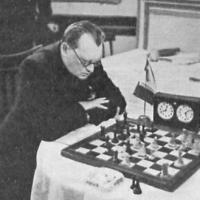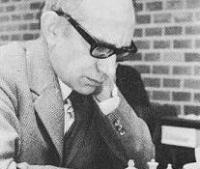
The Genius of the Combination, pt 3
In the two years that Alekhine was without the world champion's crown, he finished 2nd place, at Podebrady with 12.5 of 17 half a point behind Salo Flohr. Also in 1936, Alekhine played in Nottingham, where h is game with Capablanca was the first time they had met since the world championship match. In 1937, Alekhine won in Bad Nauheim, with 6.5 of 9; and he finished 3rd in Amsterdam, with 4.5 of 7, half a point behind Euwe and Fine. Alekhine won the 17th Hastings tournament of 1936-37, with 8 of 9. In 1937, Alekhine finished 3rd at Margate, with 6 of 9, behind Fine and Keres. He was 4th at Kemeri, with 11.5 of 17, half a point behind Flohr, Reshevsky, and Petrovs.
In 1938, after regaining the crown of world champion, he traveled to Montevideo, Uruguay; Alekhine won the tournament, with 13 of 15. Alekhine won at Margate, with 7 of 9. Then came the strongest tournament in history, the 1938 AVRO tournament in Holland, in which the top eight players in the world participated. Alekhine for the first time in his life, came ahead of Capablanca; but he also finished behind Keres, Fine, and Botvinnik.
In 1939, Alekhine was representing France at the chess Olympiad in Buenos Aires when World War II broke out. As team captain he refused to allow his team to play with Germany. In the Olympiad, Alekhine won the individual silver medal, with 12.5 of 16 points behind Capablanca. Shortly after the Olympiad, Alekhine swept in the tournaments of Montevideo with 7 of 7, and in Caracas with 10 of 10.
Alekhine took part in chess tournaments in Munich, Salzburg, Krakow/Warsaw, and Prague, organized by Earhart Post, the Chief Executive of the Nazi-controlled Grossdeutscher Schachbund ("Greater Germany Chess Federation") - Keres, Bogoljubov, Gosta Stoltz, and several other strong masters in Nazi-occupied Europe also played in such events.
In 1941, Stoltz won a tournament at Munich, while Alekhine finished second with 10.5 of 15; this same year, he tied for 1st at Cracow/Warsaw with Paul Schmidt, with 8.5 of 11, and won at Salzburg with 7.5 of 10. In 1942, he won at Munich with 8.5 of 11, also at Warsaw/Lublin/Cracow with 7.5 of 10. In 1943, he won at Prague with 17 of 19, tied for 1st with Keres at Salzburg with 7.5 of 10. After that, Alekhine was spending all his time in Spain and Portugal; in 1944, he won at Gijon with 7.5 of 8. That year his older sister died in the USSR.
In early March, 1946, he received a telegram from Mr. Derbyshire, the President of the British Chess Federation, transmitting a challenge to a match with the Russian champion, Mikhail Botvinnik. On March 24, 1946 Alekhine died in his hotel room (the Park Hotel) in Estoril, Portugal (just outside Lisbon) at the age of 53. He was dressed in an overcoat to keep warm and slumped back in a ratty armchair with a peg chess set on the table and his dinner dishes in front of him.
He is fluent in six languages, holds a doctorate in law; obviously he has the most memory that has ever existed in chess. (Capablanca)
In Alekhine, we are captivated by his exceptional combinative talent, and his love and passion for chess. (Tal)
From my younger years, I was greatly influenced by Alekhine games and fascinated by his style. (Kasparov)
.






